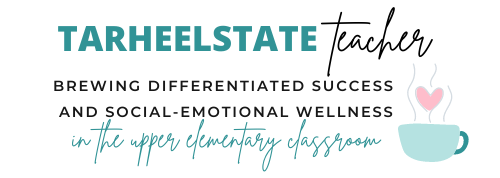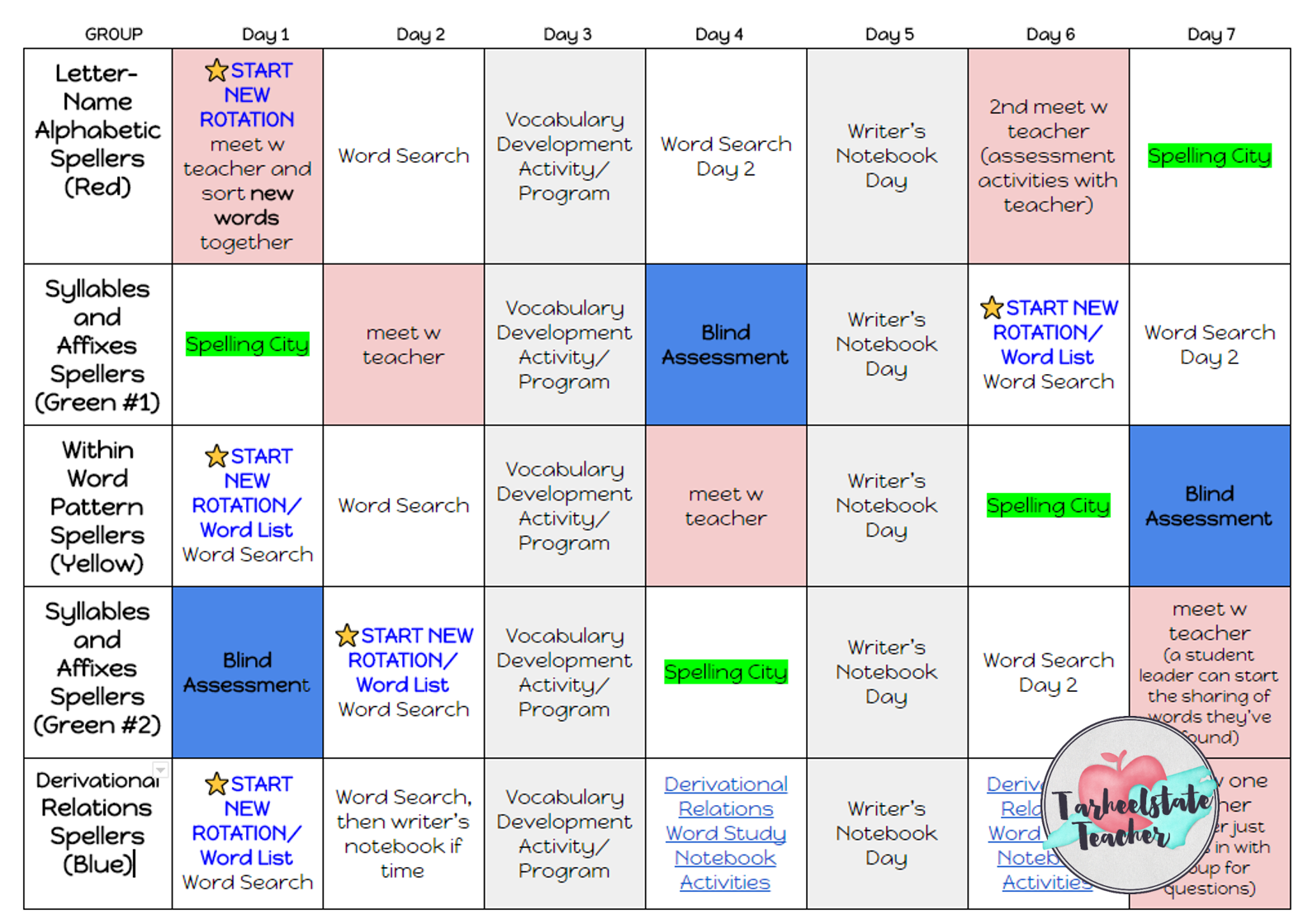How to Modify and Differentiate your Word Study Routine
In January, I wrote a quick little blog series about my Word Study Activities and Routines and how I use Words Their Way. I could {obviously} talk about word study forever and I found that there was another aspect of my Words Their Way word study routine that I'd like to share more about—how I modify my word study activities and expectations in order to add more differentiation to students’ word study routines.
If you have not read about my word study routine, I highly recommend reading that post first.
The main activities I incorporate into word study are 1) "blind" word searches, 2) Boom Learning or other tech-based programs and games, 3) meeting with the teacher to sort words, review word patterns, practice spelling, and discuss unknown words, and 4) "blind" assessments.
Although my average/middle groups of spellers don't need many modifications from the schedule that I shared with you, I've always done things a little differently for my lowest spellers and my highest spellers. You can probably see some of the differentiation steps I take for them in the schedule below:
3 Ways I Modify For my Letter-Name Alphabetic Spellers
Yes, even as a 4th and 5th grade teacher, I always had a small group of students in the Letter-Name group. Students in this group were also my struggling readers and needed a lot of basic spelling work and help to make sure they could read the words correctly.
Here are some tips for how I further modify their word study routine:
I've found that my lower groups need practice, practice, practice, and immediate feedback in order to improve their spelling {aka--more one on one attention}.
I always schedule a "meet with the teacher" day with them before their "word search day." This gives them exposure to the word patterns they will be working with and hopefully a boost of confidence as they search for their words the following day.
When these kiddos meet with me, I give them a whiteboard, marker, and eraser and fire off words from the list they are on and from previous lists. We often have to focus on short sounds vs long sounds, words with double vowel patterns, and making sure we have represented all of the sounds found in the words. I want the time I spend with this group to be focused on spelling and immediate feedback. If students miss a word, I am sure to throw in another word with the same letter pattern later on in the meeting.
As often as possible, I try to pull in compound words that still fit the patterns these students are studying. Compound words are often made up of two words that follow regular spelling patterns (hotdog, pancake, birthday, etc.) This allows students to practice DOUBLE the words and will allow them to feel like they are working on words just as large as other groups in the class. This is a great way to boost confidence for a group that can become stigmatized. {You can even make coming up with compound words part of your meeting activities! How fun!}
Extension Activities for the Derivational Relations Spellers
Students who fall into the Derivational Relations Spellers (the blue group) are my best spellers. After years of using the Words Their Way Word Sort books with these students and incorporating my word searches, I still felt that the Derivational Relations Group needed a little something more for their word study activities.
Students who fall into the Derivational Relations Spellers group can often spell the words provided in their sorts with much ease.
Typically, these students also find it easy to quickly attain word meanings and spellings for new words. Their word study assignments become more about learning word meanings and word etymology (the study of the history of words their origin). It's also important that they spend time connecting the words they are studying to other words in the English language.
In the past, I have had this group complete Frayer Model-type activities (pick 10 words, record synonyms, draw an illustration, make a personal connection, write a definition or a sentence, generate other words that contain the word part, etc). and create crossword puzzles for others in their group to complete as extension activities.
However, these default activities never felt organized or worthwhile enough, and quite frankly, I never gave this group enough attention or oversight.
So a few years ago, I finally decided I wanted to get ahead of the game and have individual extension activities that made sense for each of the Derivational Relations Units. I felt like word study notebook activities would give this group more structure as they completed extension activities and as I met with them to extend their learning about the words they were studying.
These Word Study Notebook Activity sheets for each sort in the Derivational Relations Spellers book have students analyzing spellings, sound changes, and the meanings of their word study words.
The activities are designed for independent exploration and reinforcement of concepts that are embedded in the unit of study. However, these activities could also be used to guide your small group lessons with this group.
As a side note, I also think that the Derivational Relations Spellers sorts would be perfect for 5th-6th grade as a whole-class vocabulary/word study program combined with differentiated spelling/word study. 4th and 5th grade teachers could use these activities during whole-group language lessons to expose students to prefixes, suffixes, and Greek and Latin roots--the main focus of the blue book.
Based on the level of difficulty of the activity pages and how progressed your students are with being “independent thinkers,” you may choose to have them complete some of the sheets independently and save others for their small group meeting with the teacher. These sheets can also be completed in partners.
To plan for this group, you can specify how you want the activities completed prior to students beginning the set of activities for each sort.
Allowing students to work in partners at the beginning of a unit (say the first and second sorts in the unit) and then expecting students to complete later activities in the unit independently is another way you can provide extra support and scaffolding. I like to have students pair up and share their work after they complete the activities.
Since these students have an entirely different assignment to incorporate into their word study routine, you will notice that their activities (on the schedule) are different.
My derivational relations group still starts with a "blind word search" activity to launch a new word list (this means that they do not receive a copy of the word list and must "blindly" search for correctly spelled words in the word search). This group spends day 1 and day 2 working on their word searches.
For their next two word study blocks, they work on the Derivational Relations Notebook Activities to extend their understanding of the words they have discovered.
On the last day of their word study routine, I meet with this group. This meeting provides an opportunity for us to go over activities that students had difficulty with and to reinforce specific word study concepts based on the word list students are working on. I may also have saved a word study notebook activity for us to work on in the whole-group.
If you are interested in taking the Derivational Relations Activities for a test drive, I have shared Sorts 1 and 22 as a freebie. I've also created a similar set of Word Study Notebook Activities for the Syllables and Affixes and Within Word Pattern groups. These are your mid-higher spellers who may also benefit from completing extension activities with their word study words.
Modifying the Word Search Routine with Younger-Grades Students
If you a younger-grades teacher who is adding word searches to your word study routine, you may modify the schedule entirely to have your "meet with the teacher day" before each group works on their word searches. This will allow you to expose students to their word sort before they begin searching for their words in the word search.
You could also give students a copy of their list of words to accompany them as they do their word search activity.
As students become more confident with the word search activity, you could phase this scaffolding out and reorganize your schedule so that you meet with them after they have attempted to find words --perhaps at the start of a new quarter. I also encourage you to consider giving them a few words from the list to get them started and then having them search for words with similar patterns. The word searches are a challenge for students at any level, but I have found that they grow more and more confident as they repeatedly complete this activity.
If you have not purchased the Words Their Way Word Sorts books, I highly recommend checking them out. You can check out the 3rd Edition Word Sort books, released in 2018 here:
Letter and Picture Sorts for Emergent Spellers
Word Sorts for Letter-Name Alphabetic Spellers
Word Sorts for Within Word Pattern Spellers
If you can't get enough of thinking about how to improve your word study instruction and routines, you might check out my other posts in the series: for a 7 Day Overview of My Routines, how I really organize my schedule, and my best tips for managing word study and making the routines go even smoother! Click below to read more!
⇒ Additional Tips and Suggestions for Word Study
⇒ Differentiating Your Word Study Routine









